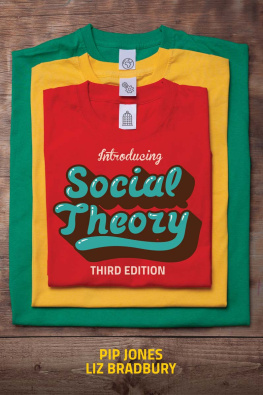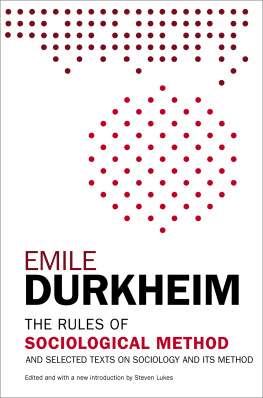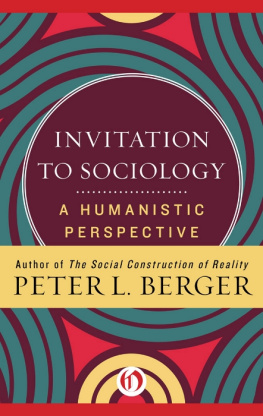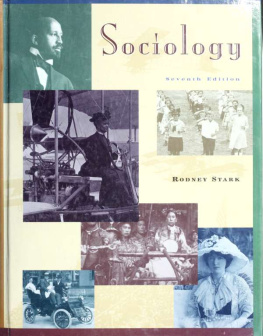Routledge Revivals
Sociology in Action
This book, first published in 1976, discusses four classical paradigms for sociology the positivism of Saint-Simon and Comte, Durkheim, Marx and Weber and four contemporary developments or revisions of them the sociologie active of Dumazedier and his colleagues in France, sociology in Socialist Poland, the work of Dahrendorf and the new sociology of Mills and his successors. Christopher Bryant suggests that no neutral language exists in which to compare the characteristics of these different paradigms, yet highlights those features which are common to all of them. Unique in its approach and analysis of the relationship between sociology and action, this book is of value and interest to students of sociology and theory and professional sociologists.
Sociology in Action
A Critique of Selected Conceptions of the Social Role of the Sociologist
Christopher G. A. Bryant
First published in 1976
by George Allen & Unwin Ltd
This edition first published in 2013 by Routledge
2 Park Square, Milton Park, Abingdon, Oxon, OX14 4RN
Simultaneously published in the USA and Canada
by Routledge
711 Third Avenue, New York, NY 10017
Routledge is an imprint of the Taylor & Francis Group, an informa business
1976 Christopher G. A. Bryant
All rights reserved. No part of this book may be reprinted or reproduced or utilised in any form or by any electronic, mechanical, or other means, now known or hereafter invented, including photocopying and recording, or in any information storage or retrieval system, without permission in writing from the publishers.
Publishers Note
The publisher has gone to great lengths to ensure the quality of this reprint but points out that some imperfections in the original copies may be apparent.
Disclaimer
The publisher has made every effort to trace copyright holders and welcomes correspondence from those they have been unable to contact.
A Library of Congress record exists under LC control number: 76372935
ISBN 13: 978-0-415-83164-2 (hbk)
ISBN 13: 978-0-203-76893-8 (ebk)
Sociology in Action
A Critique of Selected Conceptions of the Social Role of the Sociologist
CHRISTOPHER G. A. BRYANT
First published in 1976
This book is copyright under the Berne Convention. All rights are reserved. Apart from any fair dealing for the purpose of private study, research, criticism or review, as permitted under the Copyright Act, 1956, no part of this publication may be reproduced, stored in a retrieval system, or transmitted, in any form or by any means, electronic, electrical, chemical, mechanical, optical, photocopying, recording or otherwise, without the prior permission of the copyright owner. Enquiries should be addressed to the publishers.
George Allen & Unwin Ltd 1976
ISBN 0 04 300058 4
Printed in Great Britain
in 10 point Times Roman type
by Redwood Burn Limited
Trowbridge & Esher
For Elizabeth
I wish to thank:
The Nuffield Foundation for supporting this study financially;
The Polish Government for a bursary which enabled me to visit Warsaw in April 1971, and the twenty-two sociologists at the Institute of Philosophy and Sociology of the Polish Academy of Sciences and the Institute of Sociology of the University of Warsaw who discussed their work with me on that occasion, especially my host Dr Edmund Mokrzycki;
Professor Ralf Dahrendorf for giving me an interview in Brussels in February 1971 and for his comments on an earlier draft of ;
Professor Joffre Dumazedier and Mme Nicole Samuel for giving me an interview in Paris in June 1971;
Professor Maurice Broady and Professor John Smith, my successive Ph.D supervisors, for their help and encouragement;
Colleagues and students in the University of Southampton, where I have lectured since 1966, and the Johann Wolfgang Goethe University of Frankfurt am Main, which I have visited four times since 1970, for their witting and unwitting help over the years.
C.G.A.B.
Southampton, March 1974
Contents
Introduction
Sociological research and teaching cannot be hermetically sealed off from other social processes: they both affect them and are affected by them. In the interests of simplicity the relations between sociology and society may be said to divide into three categories. Firstly, there are social influences upon the formation of sociological thought. Secondly, there is the influence of sociological thought upon other social processes. In either case establishing empirically the nature of these relationships poses enormous problems of research design, but if there are ever to be sociological accounts of sociological practice they will have to be faced. Thirdly, there is the question of what sociologists themselves think the object of their labours is, what they think their social role is and what social, political and economic developments they would seem to facilitate or obstruct by the very ways they construct their sociologies. It is with this third question that I am principally concerned.
In referring to the construction of sociologies in the plural I wish to insist from the outset upon the multi-paradigmatic state of sociology in the past, the present and the foreseeable future. The term paradigm is an old one but it has found a new vogue following the publication of Kuhns The Structure of Scientific Revolutions in 1962.1 It is used in the latter in many different ways and it has been further varied subsequently.2 Kuhn now suggests that in a general sense a paradigm is an entire constellation of beliefs, values, techniques, and so on shared by the members of a given community, i.e. a disciplinary matrix of concepts, assumptions, basic laws, proven methods and other objects of commitment common to all practitioners of a specified discipline or a sub-discipline which may or may not be necessarily related but which certainly require individual specification.3 In a more restricted sense, however, a paradigm refers to one element in the matrix, the exemplar, the concrete problem solution which provides a model for subsequent inquiry. Typically the exemplar takes the form of a symbolic generalisation, a law-sketch, like f = ma (Newtons Second Law), which has to be rewritten in a different symbolic form for each physical problem before a logical and mathematical deduction are applied to it.4 According to Kuhn, physicists share few rules, explicit or implicit, by which they make the transition from law-sketch to the specific symbolic forms demanded by individual problems. Instead, exposure to a series of exemplary problem solutions teaches them to see different situations as like each other.5
I doubt whether there are many exemplars in sociology. Sometimes particular books, Durkheims Suicide and Lynds Middletown are favourite examples, or particular research instruments, for instance the sample survey, or particular generalisations, such as the history of all hitherto existing society is the history of class struggle, have been treated in an exemplificatory way but they still lack the concreteness and the authority of exemplars in natural science.6 On the other hand it is incontrovertible that there are a number of paradigms in the sense of disciplinary matrices extant in sociology: structural functionalism, social evolutionism, conflict theory, action theory, phenomenological sociology, ethnomethodology (though some would dispute that it is a sociology), to say nothing of the continuing presence of Marx, Durkheim and Weber, are only the most conspicuous. In each case we have before us a distinct constellation of values, axioms, concepts, methods and basic theories which constitutes the object world of sociology in a particular way and points up the work which needs to be done.










